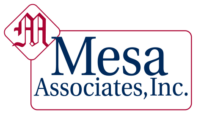Mesa’s mechanical engineering department consists of engineers, designers and CAD operators that are experienced in the project delivery of mechanical systems and components. Our experience from power, heavy industry, and general facilities projects translates to efficient and quality designs.
Piping Engineering
Mesa has performed numerous piping designs for power plant, industrial, and chemical installations. These designs have been completed in accordance with the following ASME Code piping classifications:
- Power Piping
- Fuel Gas Piping
- Process Piping
- Refrigeration Piping
- Gas Transmission
- Building Services
Mesa has expert knowledge in the design, testing and examination of piping systems. Mesa has performed designs for plant piping systems including underground potable water, steam and condensate, process chemicals, compressed air, industrial gases (hydrogen, oxygen, natural gas, propane, and nitrogen), cooling tower water, chilled water, and drains. Capabilities also include designs for specialized piping systems involving acid handling, hydraulics (open loop and closed loop systems), high vacuum, low-level waste, and double containment piping.
Additionally, Mesa has performed design and analysis calculations for the following applications: pressure drop, stress and pipe supports. In the performance of these designs, Mesa is familiar with preparing the necessary design documents such as design criteria, cost estimating, drawings (both orthogonals and isometrics generated in both a 2D and 3D CAD environment), pipe/ valve/ construction specifications, data sheets, bills of materials, and testing criteria.
Mechanical Systems/Equipment Design
Material Handling
Mesa’s personnel have provided material handling system design for a wide variety of products, utilizing both mechanical and pneumatic conveying systems. The designs have included belt conveyor, drag chain conveyors, pan conveyors, screw conveyors, roller conveyors, silo unloaders, and pneumatic conveying systems. Mesa has experience in conveying a wide variety of products including: minerals (lime, cement, coal, soil, rock, silicants, etc.), food materials, and other high and low-density materials. These designs have had successful operation in the nuclear, industrial, and chemical industries.
Utility Systems
Mesa has performed utility system designs for compressed air systems, raw cooling water systems, cooling water systems, cooling towers, potable water, hydraulic systems, lubricating systems, and others. Our experience includes engineering, design, installation support, and commissioning of these systems.
Boiler Components
Mesa’s experience with boilers and boiler components include burner management systems, fans and blowers in both induced draft and forced draft operations, burners, igniters, and the associated ducting, dampers, and expansion joints.
Tank and Vessels
Mesa has a vast knowledge of tank and pressure vessel design. Our experience includes designs for chemical, nuclear, and power generating facilities. Mesa has performed vessel designs including calculations that meet the ASME Boiler and Pressure Vessel Code Section 8, API 650 and API 620. Specification of protection devices and applicable lining and coatings has also been provided, as required.
Heating, Ventilating, and Air Conditioning (HVAC) Design
Mesa has a staff that is familiar with and experienced in the codes, standards, principles, and practices related to industrial Heating, Ventilating, and Air Conditioning (HVAC) design for new facilities and retrofit of existing facilities. Mesa has provided designs for heating, ventilation, air conditioning, refrigeration, specialized temperature and humidity control, control systems (direct digital, pneumatic, and electric), and the application of engineering controls and design for confinement ventilation exhaust systems to protect the worker and the environment from toxic and radioactive materials for many applications.
These systems have included hoods or enclosures and utilize HEPA filters or other means to remove particulate, chemicals, or gases before discharge to the atmosphere. Additionally, Mesa’s personnel have performed energy management and applied energy conservation techniques including computerized energy analysis, life cycle costing, and application of the Code of Federal Regulations (CFR), Parts 435 and 436 as related to energy conservation in federal facilities.

